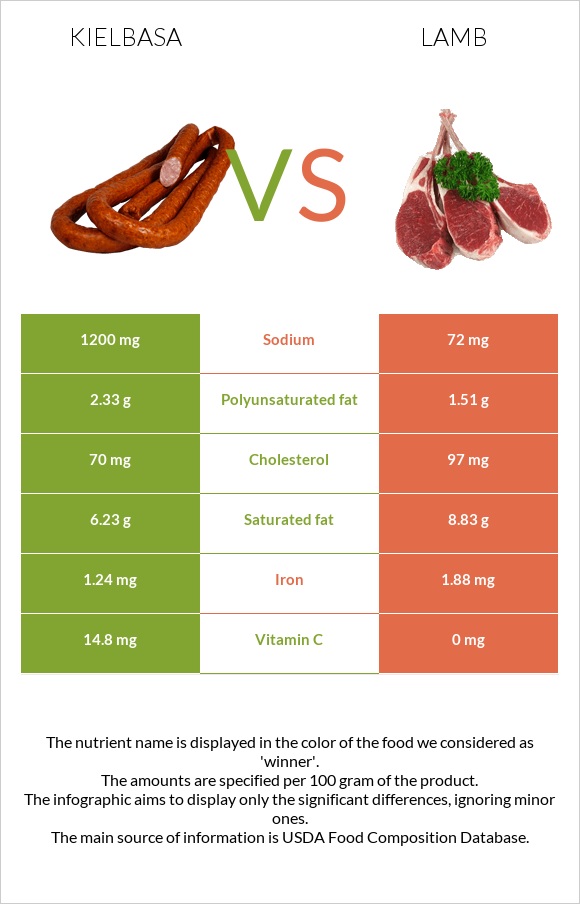Kielbasa vs. Lamb — In-Depth Nutrition Comparison
Compare
What are the main differences between kielbasa and lamb?
- Kielbasa is richer in vitamin C and polyunsaturated fat, yet lamb is richer in iron.
- Kielbasa's daily need coverage for sodium is 49% higher.
- Lamb contains less sodium.
- Lamb has a lower glycemic index than kielbasa.
We used Kielbasa, Polish, turkey, and beef, smoked and Lamb, domestic, composite of trimmed retail cuts, separable lean, and fat, trimmed to 1/4" fat, choice, cooked types in this comparison.
Infographic

Infographic link
Mineral Comparison
Mineral comparison score is based on the number of minerals by which one or the other food is richer. The "coverage" charts below show how much of the daily needs can be covered by 300 grams of the food.
| Contains more IronIron | +51.6% |
| Contains less SodiumSodium | -94% |
Vitamin Comparison
Vitamin comparison score is based on the number of vitamins by which one or the other food is richer. The "coverage" charts below show how much of the daily needs can be covered by 300 grams of the food.
| Contains more Vitamin CVitamin C | +∞% |
All nutrients comparison - raw data values
| Nutrient |  |
 |
DV% diff. |
| Vitamin B12 | 2.55µg | 106% | |
| Sodium | 1200mg | 72mg | 49% |
| Selenium | 26.4µg | 48% | |
| Vitamin B3 | 6.66mg | 42% | |
| Zinc | 4.46mg | 41% | |
| Phosphorus | 188mg | 27% | |
| Protein | 13.1g | 24.52g | 23% |
| Vitamin B2 | 0.25mg | 19% | |
| Choline | 93.7mg | 17% | |
| Vitamin C | 14.8mg | 0mg | 16% |
| Copper | 0.119mg | 13% | |
| Vitamin B5 | 0.66mg | 13% | |
| Saturated fat | 6.23g | 8.83g | 12% |
| Vitamin B6 | 0.13mg | 10% | |
| Cholesterol | 70mg | 97mg | 9% |
| Potassium | 310mg | 9% | |
| Iron | 1.24mg | 1.88mg | 8% |
| Vitamin B1 | 0.1mg | 8% | |
| Fats | 17.6g | 20.94g | 5% |
| Magnesium | 23mg | 5% | |
| Folate | 18µg | 5% | |
| Polyunsaturated fat | 2.33g | 1.51g | 5% |
| Vitamin K | 4.6µg | 4% | |
| Calories | 226kcal | 294kcal | 3% |
| Calcium | 17mg | 2% | |
| Carbs | 3.9g | 0g | 1% |
| Vitamin E | 0.14mg | 1% | |
| Vitamin D | 0.1µg | 1% | |
| Manganese | 0.022mg | 1% | |
| Monounsaturated fat | 8.27g | 8.82g | 1% |
| Net carbs | 3.9g | 0g | N/A |
| Vitamin D | 2 IU | 0% | |
| Tryptophan | 0.287mg | 0% | |
| Threonine | 1.05mg | 0% | |
| Isoleucine | 1.183mg | 0% | |
| Leucine | 1.908mg | 0% | |
| Lysine | 2.166mg | 0% | |
| Methionine | 0.629mg | 0% | |
| Phenylalanine | 0.998mg | 0% | |
| Valine | 1.323mg | 0% | |
| Histidine | 0.777mg | 0% |
Macronutrient Comparison
Macronutrient breakdown side-by-side comparison
| Contains more CarbsCarbs | +∞% |
| Contains more WaterWater | +15.4% |
| Contains more OtherOther | +314.6% |
| Contains more ProteinProtein | +87.2% |
| Contains more FatsFats | +19% |
Fat Type Comparison
Fat type breakdown side-by-side comparison
| Contains less Sat. FatSaturated fat | -29.4% |
| Contains more Poly. FatPolyunsaturated fat | +54.3% |
~equal in
Monounsaturated fat
~8.82g





